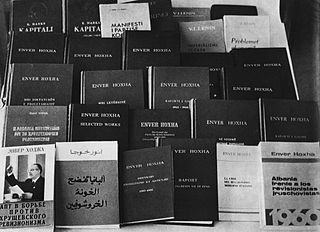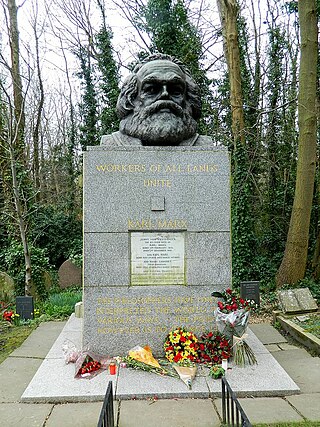Related Research Articles
Marxism–Leninism is a communist ideology that became the largest faction of communism in the world following the October Revolution. It was the predominant ideology of most socialist movements throughout the 20th century. Developed in Russia by the Bolsheviks, it was the state ideology of the Soviet Union, Soviet satellite states in the Eastern Bloc, and various countries in the Non-Aligned Movement and Third World during the Cold War, as well as the Communist International after Bolshevisation. Today, Marxism–Leninism is the ideology of the ruling parties of China, Cuba, Laos and Vietnam, as well as many other Communist parties. The state ideology of North Korea is derived from Marxism–Leninism. Marxist–Leninist states are commonly referred to as "communist states" by Western academics. Marxist–Leninists reject anarchism and left communism, as well as reformist socialism and social democracy. They oppose fascism and liberal democracy, and are self-proclaimed anti-imperialists. Marxism–Leninism holds that a two-stage communist revolution is needed to replace capitalism. A vanguard party, organized through democratic centralism, would seize power on behalf of the proletariat and establish a one-party socialist state, called the dictatorship of the proletariat. The state would control the means of production, suppress opposition, counter-revolution, and the bourgeoisie, and promote Soviet collectivism, to pave the way for an eventual communist society that would be classless and stateless.

Trotskyism is the political ideology and branch of Marxism developed by Russian revolutionary Leon Trotsky and some other members of the Left Opposition and Fourth International. Trotsky described himself as an orthodox Marxist, a revolutionary Marxist, and a Bolshevik–Leninist as well as a follower of Marx, Engels, Vladimir Lenin, Karl Liebknecht, and Rosa Luxemburg. He supported founding a vanguard party of the proletariat, proletarian internationalism, and a dictatorship of the proletariat based on working-class self-emancipation and mass democracy. Trotskyists are critical of Stalinism as they oppose Joseph Stalin's theory of socialism in one country in favour of Trotsky's theory of permanent revolution. Trotskyists criticize the bureaucracy and anti-democratic current developed in the Soviet Union under Stalin.

The Communist Party of Ireland is an all-Ireland Marxist–Leninist communist party, founded in 1933 and re-founded in 1970. It rarely contests elections and has never had electoral success. The party is a member of the International Meeting of Communist and Workers' Parties.
The Communist League was one of the first Trotskyist groups in Britain, formed in 1932 by members of the Communist Party of Great Britain in South London, including Harry Wicks, who had been expelled after forming a loose grouping inside the CPGB known as the Balham Group. This became the British Section of the International Left Opposition and adopted the name Communist League in June 1933. They published a monthly newspaper, Red Flag, and a quarterly journal, The Communist.

The Democratic Socialist Party (DSP) was a small left-wing political party in the Republic of Ireland. The party was formed by a merger of Jim Kemmy's Limerick Socialist Organisation and the Socialist Party of Ireland. Jim Kemmy was an Irish politician and member of Dáil Éireann. He left the Labour Party in 1972. A number of members of the British and Irish Communist Organisation also joined the party.
The Irish Workers' Group (IWG) was a Marxist political party in Ireland. It originated as the Irish Workers Union, which later called itself the Irish Communist Group, and contained a variety of people who all considered themselves to be Marxists. Some were from an Irish Republican background, and some, including Gerry Lawless, also became involved in Saor Éire.
People's Democracy was a political organisation that arose from the Northern Ireland civil rights movement. It held that civil rights could be achieved only by the establishment of a socialist republic for all of Ireland. It demanded more radical reforms of the government of Northern Ireland than the Northern Ireland Civil Rights Association.

The Communist Organisation in the British Isles (COBI) was a Marxist-Leninist political party in Britain and Ireland. It was founded in 1974 by members of the British and Irish Communist Organisation (BICO) who disagreed with BICO's stance on workers' control, which the COBI described as reducing "the working class to a plastic object of bourgeois history" and "fundamentally anti-Marxist". The COBI, however, retained several of BICO's policies, including supporting the partition of Ireland, backing the UK joining the European Economic Community, and opposition to Trotskyism.
The League for a Workers' Republic (LWR) was a Trotskyist organisation in Ireland.
The Marxist Group was an early Trotskyist group in the United Kingdom.
The Revolutionary Marxist–Leninist League was a small Maoist political party in Britain.
The Leninist League was a small Oehlerite organisation set up by Dennis Levin in Glasgow, Scotland in 1932, originally as the Glasgow Leninist League. League members also included Hugh Esson and Ernest Rogers.

Hoxhaism is a variant of anti-revisionist Marxism–Leninism that developed in the late 1970s due to a split in the anti-revisionist movement, appearing after the ideological dispute between the Chinese Communist Party and the Party of Labour of Albania in 1978. The ideology is named after Enver Hoxha, a notable Albanian communist leader, who served as the First Secretary of the Party of Labour.
The Association of Communist Workers was an anti-revisionist political party in the United Kingdom.
The Revolutionary Communist League of Britain was a Maoist political party in Great Britain, formed in 1977.
The Young Socialist League was a British radical political youth group founded in 1911. The group was mostly active in London, where it also had the majority of its members. According to the Encyclopedia of British and Irish Political Organizations, the group probably had its roots in the Socialist Sunday Schools. The League was linked to the British Socialist Party, a small Marxist party, also founded in 1911, who were supporters of the Bolshevik Revolution. It published a paper called the Red Flag.
The first Revolutionary Socialist League (RSL) was formed in early 1938 by the merger of the Marxist League led by Harry Wicks and the Marxist Group led by C. L. R. James.
Sam Nolan is the secretary of the Dublin Council of Trade Unions and a political activist.

Far-left politics in the United Kingdom have existed since at least the 1840s, with the formation of various organisations following ideologies such as Marxism, revolutionary socialism, communism, anarchism and syndicalism.
References
- 1 2 3 politico.ie. 'Corkman in the Kremlin'. .
- ↑ Sean Swan (2008). Official Irish Republicanism, 1962-1972. Lulu. p. 90.
- ↑ Peter Barberis, John McHugh and Mike Tyldesley (2000). Encyclopedia of British and Irish Political Organizations. London. pp. 224-225.
- ↑ Kenny, Brian (2010). Sam Nolan: A Long March on the Left. Dublin: Personal Histories Publishing.
- ↑ O'Reilly, Mick (2019). From Lucifer to Lazarus: A Life on the Left. Dublin: Lilliput Press.
- ↑ Kenny, Brian (2009). Joe Deasy: A Life on the Left. Dublin: Personal Histories Publishing.
- 1 2 Swan (2008), p. 90.
- ↑ DR O'Connor Lysaght (1976). 'The Communist Party of Ireland: A Critical History: Epilogue'. .
- ↑ The Irish Times (Feb 9 2013). 'Activist who made inspiring contribution to the Irish left'. .
- ↑ Irish Left Archive (2002). .
- ↑ Swan (2008). p. 90.
- ↑ Paddy Carmody (1977). Socialism and Democracy. Irish Marxist Society. p. 6. .
- ↑ Carmody (1977). pp. 19-20.
- ↑ What's on Today? Irish Times, 23 June 1976, (p. 19) advertises a speech by Naomi Wayne on "Marxist Feminism" on behalf of the IMS.
- ↑ Barberis, McHugh and Tyldesley (2000). p. 225.
- ↑ Carmody (1977). p. 17.
- ↑ Carmody (1977). p. 18.
- ↑ Barberis, McHugh and Tyldesley (2000). p. 224.
- ↑ Eagle or Cuckoo? The Story of the ATGWU in Ireland by Matt Merrigan. Matmer Publications, Ireland, 1989 (p. 316).
- ↑ Sheehan, Helena (2019). Navigating the Zeitgeist. New York: Monthly Review Press. p. 293. ISBN 978-1-58367-727-8.